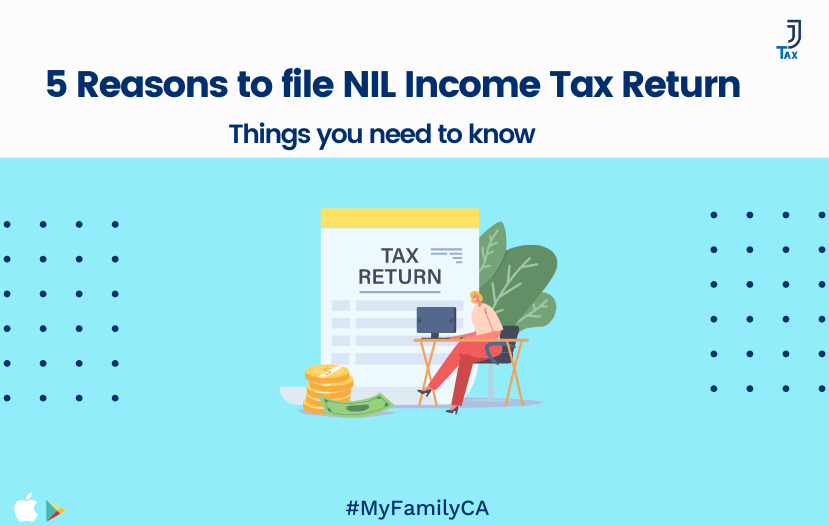Things you need to know.💫

Are you one of those people who believe that filing a NIL income tax return is not necessary because you have no income to report? If so, this newsletter is for you. We want to challenge this misconception and highlight the importance of filing a NIL income tax return in India, even if you have no income.
Filing a tax return is not just a formality, but is also a crucial aspect of being a responsible citizen. It helps ensure that taxes are collected appropriately and that the government can provide essential services to its citizens. In this newsletter, we will discuss five reasons why filing a NIL income tax return is important, regardless of your income status.
Building a Credit Score
Building a credit score is one of the most critical reasons why you should consider filing a NIL income tax return. Credit scores are used by banks and financial institutions to assess the creditworthiness of an individual, and a good credit score is essential to secure loans or credit cards.
By filing a NIL income tax return, you demonstrate to financial institutions that you are financially responsible and have a good track record of paying their taxes. This can help to build a positive credit history and lead to a higher credit score.
Moreover, filing a NIL income tax return can also help individuals qualify for higher loan amounts or lower interest rates on loans. Financial institutions tend to favor individuals with a good credit score and a clean financial record, and filing a NIL income tax return can contribute towards that.
Qualifying for loans
Another important reason to file a NIL income tax return in India is to qualify for loans. Financial institutions use an individual's tax returns as proof of their income, which helps them determine the eligibility of the individual for loans.
When you file a NIL income tax return, you’re showcasing that you have a regular source of income, even if it is below the taxable limit. This can help you qualify for personal loans, home loans, or car loans.
As we’ve mentioned before in the first point, banks measure your financial competence through a credit score. The two, qualifying for loans and building a credit score, go hand in hand with each other. Rate their financial responsibility and provide proof of income to financial institutions. This even extends to being eligible for credit cards.
Avoiding legal consequences
Not filing a NIL income tax return can result in legal consequences, including penalties and fines. Even if you have no income, it is still a legal obligation to file a tax return if you meet certain criteria. Filing a NIL income tax return can help you avoid these legal consequences.
Failing to file a NIL income tax return can have legal consequences, even if you have no income to report. The Income Tax Act of 1961, makes it mandatory for all individuals to file their income tax returns, irrespective of their income status, if their income exceeds the taxable limit, or if they meet any other criteria specified by the authorities. Failure to comply with this obligation can result in penalties, fines, and legal action.
Maintaining Clean Tax Records
A clean tax record is essential because it reflects an individual's compliance with the tax laws and regulations in India. Filing a NIL income tax return shows that an individual is honest and transparent in their financial dealings, and it helps to build trust with the government and financial institutions.
Maintaining clean tax records helps you avoid any legal or financial consequences that may arise due to non-compliance with tax laws. In case of any discrepancies or errors in tax records, you might be penalized, affecting your financial stability and reputation.
By filing a NIL income tax return, individuals can also keep track of their income and expenses and maintain a clear record of their financial transactions. Maintaining clean tax records safeguards you in case of an audit by the income tax department. In case of any discrepancies, individuals who have filed their tax returns regularly and maintained clean tax records are less likely to face legal consequences.
Reducing Future Tax Liability
Reducing future tax liability is another significant reason why you should consider filing a NIL income tax return. Let us explain why.
Firstly, you can carry forward any losses incurred during the financial year to the next financial year. These losses can be set off against future income, reducing the tax liability for the future financial year.
Secondly, filing a NIL income tax return enables you to claim tax deductions and exemptions that you may be eligible for. For example, taxpayers can claim deductions for investments made under Section 80C of the Income Tax Act, such as contributions to a Provident Fund, National Savings Certificate, and Equity-Linked Savings Scheme, among others.
Thirdly, filing a NIL income tax return can also help individuals avoid penalties and interest charges that may be imposed for non-compliance with tax laws. Non-filing of income tax returns can attract a penalty of up to Rs. 10,000 under Section 234F of the Income Tax Act.
Bottom Line
If you’ve never filed your taxes before, then filing a NIL income tax return may seem like a daunting task, but it comes with a range of benefits that can help you achieve your financial goals. From building a credit score and qualifying for loans to reducing future tax liability and maintaining clean tax records, the advantages are numerous.
At JJ Tax, we believe that every individual deserves access to accurate and reliable tax advice, regardless of income level. That's why, at JJ Tax, we provide personalized tax services to help our clients navigate the complexities of the Indian tax system and file their tax returns with ease.

